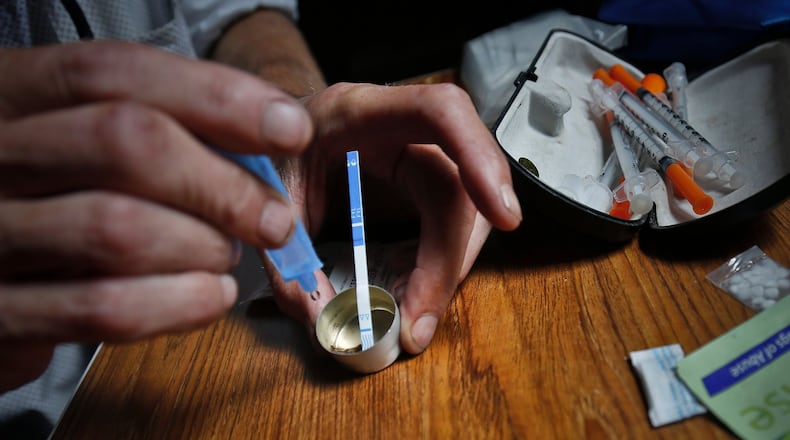Fentanyl contributed to 3,431 deaths in Ohio in 2017, about 70 percent of total accidental overdose deaths that year. In Montgomery County, 566 people died from drug overdoses in 2017 — and two thirds of them had fentanyl present in their bodies.
RELATED: Mom in recovery says jail was 'best thing that ever happened to me'
The strips, designed to test urine in a drug screening, also can be used by people who inject opioids to determine if fentanyl has been mixed into their drugs. If fentanyl is present, they can take steps to reduce the risk of an overdose, including not using the substance, using less of it, not using by themselves or having a naloxone rescue kit nearby.
“All the major metropolitan areas in Ohio are looking at fentanyl test strips and what to do with them,” said Dr. Michael Dohn, medical director at the public health district.
Harm reduction advocates have pushed for test strips to be made widely available as a way to save lives. Critics, though, see the strips and other harm reduction measures like needle exchanges as sanctioning illegal drug use and local law enforcement agencies say every user should assume every street drug has fentanyl in it.
RELATED: Montgomery County Coroner says local overdose deaths are climbing again
There hasn’t been a lot of research done on how the strips are used or their effectiveness in preventing deaths, Dohn said, but evidence thus far suggests that people who test their drugs tend to engage in less risky behaviors.
As the test strips have become more available in Canada, the government agency Health Canada has issued statements about their limitations, including that they might not detect versions of fentanyl like carfentanil and that they don’t indicate how much fentanyl is present.
“To help prevent a fatal overdose, it is important to treat all street drugs as though they are potentially contaminated with unknown deadly substances,” the health agency said.
The strips are being distributed in Montgomery County at weekly Families of Addicts meetings, quarterly Conversations for Change events and other outreach events in the area, FOA founder Lori Erion said.
RELATED: Millions of tax dollars pay for drug treatment — is it working?
The goal of harm reduction is to make sure the person stays alive long enough to get help for their addiction, Erion said. Providing the strips also creates an opportunity to relay information about treatment options to the user.
“It’s really more about developing relationships with people and families,” Erion said.
Part of the pilot program includes surveying users as the strips are distributed to find out how they plan to use them and how they plan to alter their behavior if they get a positive result, Dohn said.
“Who is getting these and why? Do they want them because they are looking for fentanyl?” Erion said.
Methamphetamine, which local law enforcement says has increasingly become a drug of choice in the region, can also be tested for added fentanyl.
The chemical composition of methamphetamine, as well as Ecstasy, can cause a false positive if too high a concentration is tested. So the Harm Reduction Coalition recommends diluting a sample of residue of those drugs with about a half a cup of water.
Anyone interested in learning more about fentanyl test strips or obtaining them for free can contact Erion at info@foafamilies.org or 937-307-5479.
The Path Forward: Addiction in Dayton
- » Vets twice as likely to fatally OD -- what the Dayton VA is doing about it
- » ‘Life Changing Food’: This eatery hires only people recovering from addiction
- » Local chef in recovery serves up message of hope
- » New challenge for recovering addicts: Finding a job
- » Can Dayton go from 'overdose capital' to a model for recovery?
- » 'A whole new life:’ Local people share their path out of the depths of addiction, and into long-term recovery
- » Mother of 7 rebuilding family after addiction
- » A day with Dayton's overdose response team
ABOUT THE PATH FORWARD
Like all of you, we care deeply about our community and want it to be the best it can be. We have formed a team to dig into the most pressing issues facing the Miami Valley. The Path Forward project, with your help and that of a 16-member community advisory board, seeks solutions to issues readers told us they were most concerned about.
Follow the project at DaytonDailyNews/PathForward and share your ideas on our Facebook pages.
About the Author

